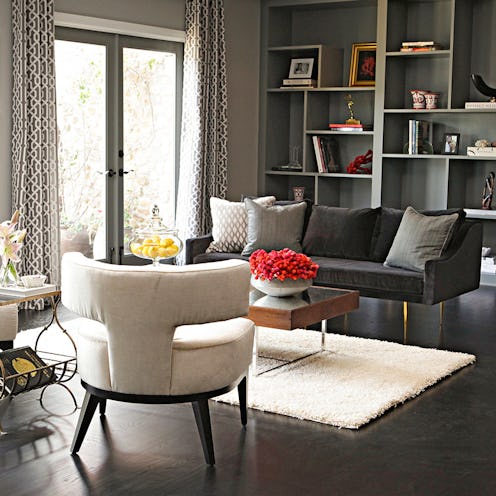(Living)
3 Signs You Shouldn’t Buy A Home

As you get older, there are a lot of expectations around things you “should” be doing: graduating from college, getting a steady job, meeting a partner, having kids, buying a house. But doing all of these things may not be right for everyone. Plenty of people will tell you that you’re throwing away money on rent—you need to put roots down with an investment in real estate. The truth is, that isn’t the best move for everyone.
It took a while before my husband and I decided to buy our home, and even now that we own a house I’m not completely sold that it was the best decision for us. Yes, we love our house. But there are some months when I wish I were a renter so I could call a landlord to fix and pay for problems (like when our furnace broke during the coldest week of the year).
If you’re wondering if you should buy a home, or you’re just looking for something to say when people accuse you of throwing money away on rent, read on for reasons why owning a home isn’t for everyone.
Do you want to invest in other places (including in yourself)? Buying a home is a massive purchase. With one check, your down payment usually wipes out everything you’ve worked so hard to save. Factor in updates and repairs, and you’re looking at spending even more money in the near future (not to mention time).
If you’re completely sold on home ownership, this probably won’t feel as scary. But if you’re waffling, even a little bit, you may find yourself feeling frustrated that you can’t invest your time and money in other things.
Buying a house can make it difficult to invest in other things, like starting a business. It can also make it difficult to invest in yourself (like taking continuing education courses or attending conferences and workshops) because you’ll not only be tight on money, you’ll also be tight on time. If investing your time and money in other things is a priority for you, it might not be the right time to buy a house.
Do you know where you want to live for the foreseeable future? Buying a home usually is a poor financial decision if you don’t intend to own it for reasonably long period of time. This is because a home purchase or sale requires thousands of dollars in fees. Your bank will charge closing costs, the realtors charge commission, and you’ll need to also pay for smaller things like title insurance.
If you’re secure in where you want to live for the foreseeable future, buying a house and owning it for years will make those costs less of a financial burden. If you’re not exactly sure where you want to live or where your job may require you to live in the future, buying a house (and then selling it quickly) could end up costing you a lot of extra money. This calculator does a great job of breaking down whether you should rent of buy. Of course it’s just as estimate, but it will show you all the fees you should consider when deciding if home ownership is for you.
Are you really ready? A friend of mine bought a beautiful home that the rest of us were slightly envious of—living there looked like a dream. But after a few months she confided in me that she had a lot of sleepless nights from the stress of buying her dream home. While it turns out it was everything she technically wanted (great neighborhood, high ceilings, easy commute to work), the massive commitment wasn’t right for her. She felt like it was too soon to be chained to a mortgage.
Just like getting married and having kids, home ownership is a huge commitment. When you make such a big purchase, it can affect all other decisions in your life. Putting down (very expensive) roots in one place can make it difficult to move cities if you want to take a different job, to pick up and take that dream vacation, or even change careers. Bottome line: Be honest with yourself if you’re not ready for the commitment of buying a house.
Can you afford everything that comes with owning a house? Owning a house will stretch you more financially than you thought possible. Unlike renting, owning a house is more than just paying a mortgage. You need to factor in monthly tax and insurance bills, along with maintenance costs that you don’t have to think about while renting.
When you rent a house and your furnace breaks, you can call your landlord and they deal with the repair. When you’re the homeowner, a broken furnace can set you back thousands of dollars. Without a solid rainy day fund, unexpected maintenance fees can land you in financial trouble quickly.
And even if owning a house is right for you, buying a house you can’t afford isn’t right. Even when you’ve decided that owning a house is right for you and you begin the house hunting process, there is a lot of pressure to stretch your budget.
Your bank might be generous with the amount they’ll offer to lend you, your real estate agent might show you homes you love but are pushing the boundaries of what you can afford, and your well meaning friends and parents might suggest that you buy something that you can “grow into.”
If the housing crisis taught us anything, it’s that buying a house you can’t afford isn’t right for anyone. Be firm with what you want, what you’re willing to buy, and what you absolutely don’t want to spend.
More from The Everygirl:
8 Changes to Make to Your Home Environment to Help You Feel Less Stressed
6 Questions To Ask When Considering Renting vs. Buying A Home
8 Quick, Budget Friendly Ideas to Update Your Space
{{unknown}}